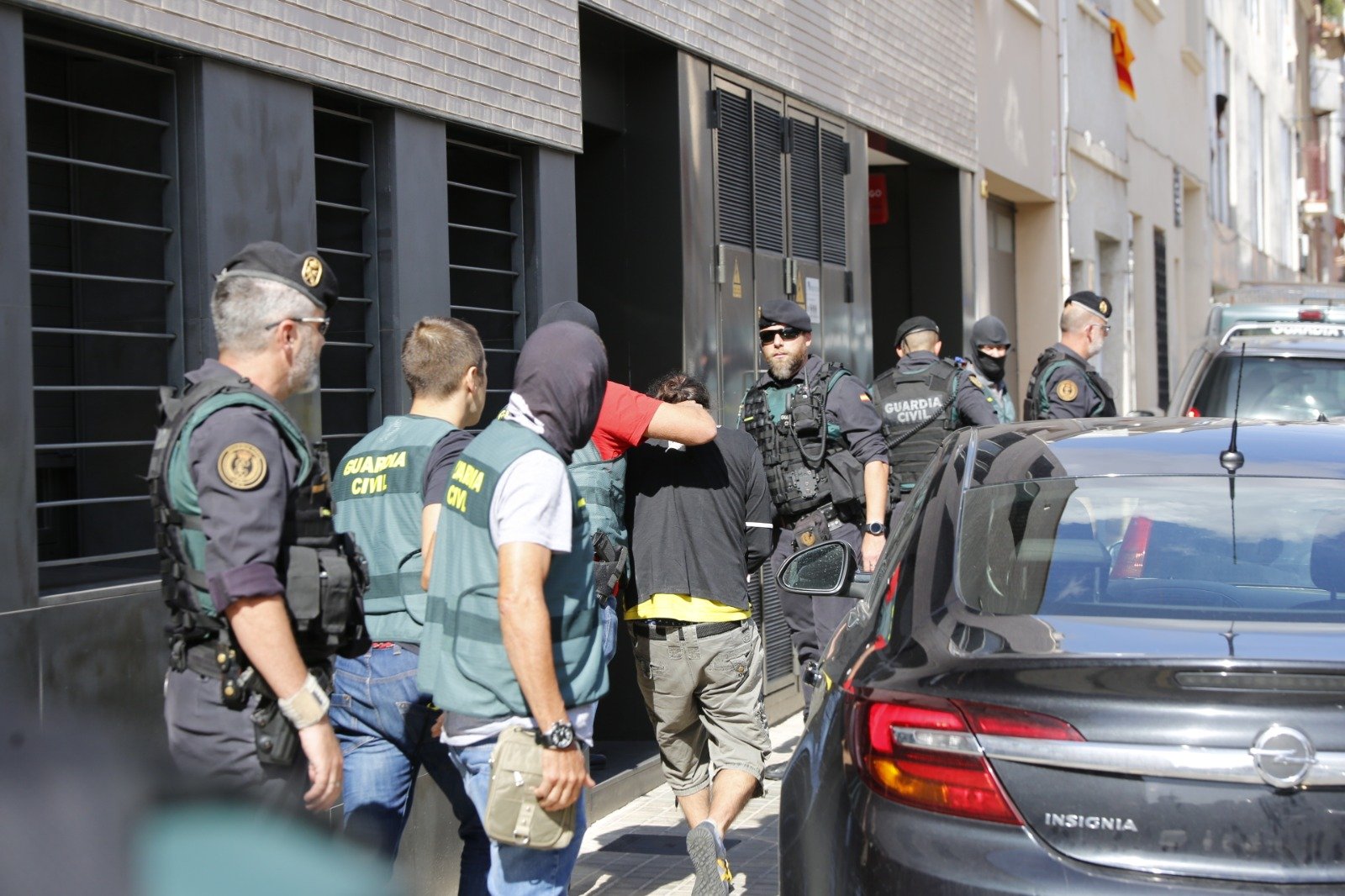Seven Catalan independence supporters arrested in the Spanish Civil Guard's 500-officer operation on Monday have been taken to Madrid to declare before Spain's National Audience court on charges of terrorism, possession of explosives and rebellion - and yet the provisions of Spain's anti-terrorism law have not been applied to them. The law states that for alleged crimes of terrorism a special prisoner regime must be applied, with detainees being maintained incommunicado, not being entitled to a lawyer until 48 hours have passed and with investigations being placed in the hands of Spain's National Audience.
Only one of these requirements has been applied, the referral to the National Audience, where the seven will appear on Thursday, according to Civil Guard sources in Madrid.
Although the anti-terrorism law has not been applied, the supposed upside of this - the arrested persons' right to a legal defence - is not being guaranteed either, according to Alert Solidaria lawyers. Lawyers have not been able to speak with the accused even though 24 hours have already elapsed since their arrest. Defence lawyers also report that the judicially-ordered secrecy of information related to the case is being violated, since details are being leaked to some media, even before the lawyers have had access to their clients.
Seven out of the nine people arrested on Monday morning, apparently members of a CDR (Committee for the Defence of the Republic) protest group, were transferred from Catalonia to the Spanish capital yesterday. Two of those detained in the huge raid were released, despite being charged with terrorism offences, after making statements at the Civil Guard barracks in Barcelona's Gràcia district. Meanwhile, the other seven were both accused of terrorism and transferred to Madrid, but the relevant regime for those accused of terrorism was not applied to them. They are currently in the custody of the Civil Guard in the Madrid locality of Tres Cantos, and on Thursday are to be interrogated by police, but under standard prisoner conditions as they have not been isolated.
Even though the anti-terrorism law on those arrested is not of immediate application, and is often used to generate tension and fear among those arrested, Spain's interior ministry did not activate any terrorist protocols before, during or after Monday's operation.
The current terrorism alert level is unchanged. It is at level 4 out of 5, a high risk. Explanations from sources within both the Civil Guard and the Public Prosecutors' Office imply that the threat of an attack is imminent, yet the interior ministry did not convene its threat assessment board. The anti-terrorist pact was not convened either.
An appearance in the National Audience awaits the seven arrested Catalans on Thursday and it seems unlikely that they will be detained for another 48 hours, up to the total of five days which is permitted under the anti-terrorism law.
All this points to the case being weak and that the accusers need "time to build" the story, according to the lawyers.
Terrorism headlines
The accusations of terrorism led to the design of a spectacular police operation on Monday as well as calls by the public prosecutor for the most severe provisions possible to be applied. But, at the moment of truth, the case may turn out to be like those of Tamara Carrasco and Adrià Carrasco, other Catalan independence activists originally charged with terrorism offences which in the end were reduced to allegations of public disorder.
In practice, there is nothing to suggest that there is strong evidence showing that the nine arrested were a Catalan terrorist group in favour of independence, as the public prosecutor claims. There could be a telephone conversation which precipitated the operation, but little else. The National Audience, under the same judge who in April 2018 directed the operation against the CDR protest group which finally reduced to nothing, hopes to be able to show that there is something more behind the CDR, in connection with a hypothetical action in response to the upcoming Supreme Court verdict. But for the time being, two of those arrested have been able to remain at large in Barcelona, although facing charges.
In theory, however, if it is a counter-terrorism operation, it should have guarantees which are not being applied at the moment.
This is not the first time that attempts have been made to link the CDR groups with terrorism, apart from the "Tamara and Adrià" cases. In the Supreme Court case of the 12 independence leaders, a Civil Guard report submitted as evidence claimed that the CDRs were linked to the 1980s group Terra Lliure and spoke of a possible rebellion based on violence from this activist movement. With regard to the rebellion charges levelled against nine of the accused in the Supreme Court case, no evidence of the necessary 'violent uprising' - the legal definition of rebellion - was presented in that instance either.
The police operation
Investigative judge No. 6 of the National Audience, Manuel García-Castellón, ordered nine arrests and ten searches in the municipalities of Sabadell, Mollet del Vallès, Cerdanyola, Santa Perpètua de Mogoda, Sant Pere de Torelló and Sant Fost de Campsentelles. Of the nine, two were released on Monday afternoon in Barcelona, facing terrorism charges. The rest went straight to Madrid.
The searches went on for more than 15 hours. The last ended at 9.00pm on Monday night, when the Civil Guard left an address in the city of Sabadell, the home of the last of those arrested. From that house, the security forces took a box, a bow and some arrows. They had entered shortly before 4pm with the Tedax explosives team and a canine unit.
Those arrested are accused of terrorism, possession of explosives and rebellion. Spanish prosecutors confirm the accusation and specify that those arrested, a "Catalan terrorist group in favour of independence", was planning to make explosives for mobilizations between 1st October and the announcement of the Supreme Court verdict in mid-October.

